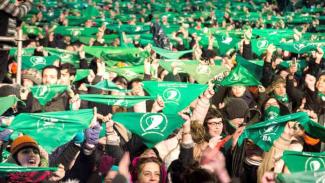
An Update on People’s Struggles And Victories Around the World
On December 30, the Argentinian Senate voted to pass a bill that will legalise abortion in the country, marking a historic victory for country’s feminist movement that has been organising for the past 15 years for the legalization of abortion. The bill, known as the Voluntary Termination of Pregnancy (IVE), legalises terminations in the first 14 weeks of pregnancy was passed with 38 votes in favour, 29 against and 1 abstention.
The legalisation of right to abortion sent out a wave of joy across Argentina, with tens of thousands of feminist activists gathering at the Argentine Congress with symbolic green bandanna/scarf. The green scarf, which became the symbol of women’s movement for liberation and rights was an allusion to the Mothers of Plaza De Mayo who wore white headscarves and fought against the disappearance of their children by the brutal dictatorship backed by the United States in Argentina in the 1980s.
In Argentina, abortion was penalised based on the 1921 regulation that criminalised the right to abortion with certain exceptions. The abortion ban led to women, especially from poor and disadvantaged communities forced to opt for clandestine and unsafe abortions out of fear of repercussions from the state authorities and the right wing anti-abortion groups.
According to reports, since the fall of dictatorship in 1983, more than 3000 women have died due to unsafe and clandestine abortions. Also, every year more than 500,000 clandestine abortions are performed and nearly 40,000 women are hospitalized after performing unsafe abortions.
The watershed movement in the campaign for right to abortion came in 2015 when mass protests swept across Argentina against the, brutal murder of 14 year old Chiara Paez, who was few months pregnant. The protests mobilised with the call - #NiUnaMenos (Not One Less) - no more women lost to gender violence. Demanding an end to all forms of gender violence, the movement also strengthened the fight for the right to abortion, LGBTQI rights and all social struggles.
The earlier attempt to legalise abortion was blocked by far-right wing Maurico Macri led senate in 2018, which rejected a similar bill. Despite massive vilification campaign and opposition from right wing anti-abortion groups in the country, the feminist movement constantly mobilised for their rights.
With the rejection of the Macri government in the 2019 elections and victory of the Frente de Todos coalition led by Alberto Fernández and Cristina Kirchner, the right to abortion struggle gained further momentum and ultimate victory on December 30 2020.
This decisive victory for the feminist movement in the long and hard fought struggle for right to abortion in Argentina is an inspiration for similar movements across the world.
Liberation Archive
- 2001-2010
- 2011-2020
-
2021-2030
-
2021
- Liberation, JANUARY 2021
-
Liberation, FEBRUARY 2021
- Republic Day 2021: Farmers Write History
- The Resonance of Netaji Subhas Chandra Bose in Today's India
- Vaccine Politics: Jettisoning Science for Jingoism
- Caging Women Is Violence Not “Safety” or “Protection”
- Constitutional Vs Majoritarian Morality
- Arnabgate and India’s Battle against the Goebbelsian Godi Media Propaganda
- Farmers Reclaim The Republic! Farmers’ Tractor Parade Reconnected Republic Day To The Spirit Of Democracy
- Notes From The Delhi Farmers’ Parade
- Gadkari Reveals Modi Regime’s Anti-Farmer, Anti-Poor Mann Ki Baat
- Three Farm Laws: Aimed to Meet Demands of Rich Countries Not Indian Farmers
- Who is Nitin Raj and Why is The Yogi Government After Him?
- 18 January: Women Farmers’ Day
- Tamil Martyrs’ Monument In Sri Lanka Demolished By Rajapaksa Regime
- We Came To Join Women Farmers At Delhi’s Borders
- Mahendra Singh Martyrdom Day: 50 KM Long Human Chain In Solidarity With Farmers
- We the People of Patna Stand with Farmers
- Solidarity Convention in Delhi For Farmers’ Movement
- The Failed Trump Coup and Lessons for India
- A Victory for Women’s Movement in Argentina
- Venezuelan people throw US-Backed Juan Guaidó Out of Power
- Free Ahmad Sa’adat Campaign
- Hands Off Our Campus! Students Protest in Philippines
- Nitish Government’s Shameless Gag Order
- Liberation, MARCH 2021
- Liberation, April 2021
- Liberation, May 2021
- Liberation, JUNE 2021
- Liberation, JULY 2021
- Liberation, AUGUST 2021
-
2021
Charu Bhawan, U-90, Shakarpur, Delhi 110092
Phone: +91-11-42785864 | Fax:+91-11-42785864 | +91 9717274961
E-mail: info@cpiml.org







